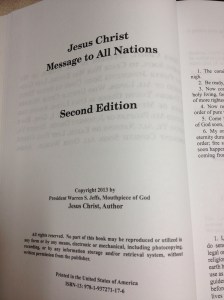The summer got away from me, as it always seems to, leaving several boxes of things yet to be sorted. Since these boxes are in the garage where there’s no heat, doing it during winter isn’t really feasible. Still, I found myself in the garage storage area the other day and quickly tipped open a box or two to remind myself of what might be inside. One of the treasures I found is actually from my wife’s family memorabilia. Not exactly a family Bible, it’s a New Testament one of her grandfathers gave one of her grandmothers as a gift. It’s a red-letter edition, but what makes it unusual is the binding. It has olive wood covers from Jerusalem. The front cover is embossed with a Jerusalem cross.
Bookbinding has long been an area of personal fascination. Growing up when and how I did, most of my books are paperbacks. The paperback was initially one of the responses to shortages introduced by wars. Since they were cheaper to produce they could be priced down. I have a few academic paperbacks from the twenties (I can’t make myself acknowledge that 1920 was a century ago) whose paper bindings are literally paper. I fear to take them off the shelf, given the fragile nature of their bindings. Prior to that books tended to be “hardbacks.” A piece of cloth-covered cardboard was the preferred means of protecting the vulnerable leaves inside. Before that leather was routinely used. Those were the days when books were properly thought of as an investment.
I often think of how little I will leave behind, at least in terms of items of monetary value. Books seldom maintain their cover price for long. As someone who lurks on used book websites, however, I do know that the choice tome of either quirky fiction or nonfiction under-appreciated at the time can easily jump market values with predatory sellers. Even for a paperback. I am loath to confess how much I’ve paid for a book I really needed for research that mere public libraries simply can’t access. (The university library is a place of wonder, and one of the resources I most often miss in having become secular.) Just this past week I saw a sci-fi book from the sixties I wanted to read priced at over $500 on Amazon (used). When I went to check on it this morning all copies were gone. And to think the world considers books a poor investment. The real key is to be obscure, no matter your binding material.















